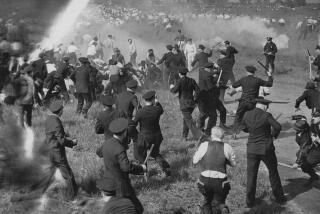Death Takes No Holiday in Iraq
- Share via
First the president, and then Hillary Rodham Clinton, popped in to spend Thanksgiving with the troops at Baghdad airport -- competing, apparently, in the Olympics of photo ops.
What’s the point? To prove that almost half a year after that last big “Mission Accomplished” photo op on the aircraft carrier, U.S. leaders can land in “liberated Iraq” without getting shot?
Unfortunately, the level of stealth and security provided to these showboating politicians can’t be replicated for our troops or those of our allies who have sent their young men and women to this adventure: 104 coalition soldiers were killed in Iraq in November, up from 43 in October and more than were slain during the war’s heaviest fighting in April.
In the days after the president’s quickie holiday visit, seven Spanish agents, two Japanese diplomats, a Colombian contractor and two South Korean electricians were murdered and three more GIs were killed.
The administration, however, insists everything is, has been and will be just fine, thank you very much. On Saturday, a U.S. spokesperson stated that attacks on Americans were down. The very next day witnessed the fiercest attack on American convoys since the so-called end of major hostilities.
No Americans were killed this time, and the military claimed that all 54 Iraqis killed were Baathist militants. Journalists entering the battle-scarred town of Samarra on Monday found a much more complex picture, however, reporting that the use of random and overwhelming firepower killed a number of innocent civilians in addition to a much smaller number of Saddam Hussein’s fedayeen loyalists than was originally reported by the military.
In any event, the anger and alienation felt by our onetime allies, the Sunnis, have reached a perhaps unprecedented height.
Those in Iraq opposing the U.S.-led occupation were described as “thugs and assassins” and “terrorists” by the president during his two-hour cameo at the U.S. garrison. This simplistic portrayal of the Iraqi opposition to the occupation, however, ignores the nationalist and religious impulses that have riven the region for centuries.
Ronald Reagan and the president’s father relied on these same demon Sunni Baathists as a bulwark against Shiite Iran and Iraq’s own Shiite majority. Now we point to the Shiites of southern Iraq as the most acquiescent to our occupation, but that will last only as long as the United States keeps favoring them over the Sunnis.
This is an inherently unstable situation, and White House policymakers are well aware of it -- which is why they have shown such extreme reluctance to transfer power to the Iraqi people.
The fact is, odds are very high that a fair national election in Iraq would lead to a Shiite takeover and a variant of the Iranian nationalist theocracy that’s been in place since the mullahs overthrew the shah, a U.S.-supported dictator.
An Iraqi theocracy, of course, would little resemble the secular democracy promised by the neoconservatives who engineered this neocolonialist venture.
Having failed to find weapons of mass destruction or any of the other justifications for his preemptive war, President Bush is desperate to discover something even more elusive; a representative government in Iraq that will not embarrass or threaten U.S. interests. It won’t happen.
Instead, the U.S. will sink deeper into this quagmire, alienating larger sections of the Iraqi population through ever more heavy-handed military responses to the guerrillas’ effective hit-and-run tactics.
But don’t for a moment accept the logic of the administration’s apologists that there is no responsible alternative. There is: Turn this mess back over to the U.N. Security Council -- which was doing a constructive job of disarming and feeding Iraq before its role was abruptly ended by Bush’s preemptive invasion.
Under U.N. leadership, it would be possible to marshal a truly international force, including U.S. troops, instead of the current token presence of allies.
The U.N.’s blue helmets have done it before in equally tough situations, and they would certainly be treated with far less suspicion by the Iraqi people than an occupying army and administration run by the world’s sole superpower.
Of course, U.N. intervention would require the president to abandon his macho unilateralism and move to embrace his father’s model of a new, multinational world order: a world of shared responsibility for keeping the peace, in which the hubris of no single nation is allowed to dominate.
Staying the course, Bush’s inherited mantra, might strike a militant patriotic chord, but his last photo op will not be the promised one of cheering crowds welcoming our president. Instead, get ready for seen-before footage of enraged mobs chasing our helicopters out, or of Iraqi demonstrators being gunned down by frightened American 18-year-olds.
Like the swaggering, self-righteous Crusaders of old, we presume to be the savior of the souls of heathens while inevitably destroying our own.
More to Read
Sign up for Essential California
The most important California stories and recommendations in your inbox every morning.
You may occasionally receive promotional content from the Los Angeles Times.










